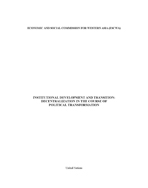
ESCWA Publication: E/ESCWA/ECRI/2013/3
Country: Arab region, Arab Republic of Egypt
Publication Type: Reports & studies
Cluster: Governance and Conflict Prevention
Focus Area: Governance & enabling environment, Resilient development & conflict prevention
Initiatives: Governance and institution building
SDGs: Goal 11: Sustainable Cities and Communities
Keywords: Arab countries, Conferences, Decentralization in government, Political conditions, Governance, Government departments, Institution building, Local government, Social movements
Institutional Development and Transition: Decentralization in the Course of Political Transformation
January 2013
Have Arab uprisings opened space for deeper, grassroots-driven decentralization reforms in the region? What are the optimum designs, sequencing and models of decentralization for countries in political transition? While political discourse in the region uniformly emphasizes reforming State institutions, decentralization reform agendas have unfolded along contrasting trajectories across Arab transition countries. Both contextual and historical dynamics seem to shape visions for the orientation and pace of decentralization reforms as well as the empirical feasibility of shifting power relations among the various tiers of State administration.
Grassroots activism at local community levels has served to empower new actors, who, in some cases, have been successful at extracting concessions from local authorities. These efforts, however, predominantly focus on improving access to public services within the existing context of centralized State structures, and seem often to have failed to gain the trust of local community members as potential partners in local governance. Building on focus group discussions among working-class residents in Greater Cairo and on interviews with Egyptian political elites, the study highlights an emerging critical gap between youth expectations and, on the other hand, the envisioned plans of the political elite. While youth are more likely to demand deeper reforms across all three dimensions of decentralization (administrative, fiscal and political), political elites disagree not only on which particular dimension(s) of reforms should be implemented, but also on the urgency of decentralization during early phases of political transformation. The latter’s wide range of views reflect deep concerns over political capture by traditional elites, weakness of political parties as well as potentially detrimental impacts of reforms on State capacity and the nation-State’s territorial integrity. The study concludes by drawing lessons from France’s successful contract-based record of decentralization and presents policy recommendations for countries that have emerged from the Arab uprisings with relatively strong centralized State structures and cohesive national identities.
Related content
Governance & enabling environment
, Resilient development & conflict prevention
,
Have Arab uprisings opened space for deeper, grassroots-driven decentralization reforms in the region? What are the optimum designs, sequencing and models of decentralization for countries in political transition? While political discourse in the region uniformly emphasizes reforming State institutions, decentralization reform agendas have unfolded along contrasting trajectories across Arab transition countries. Both contextual and historical dynamics seem to shape visions for the orientation and pace of decentralization reforms as well as the empirical feasibility of shifting power relations among the various tiers of State administration.
Grassroots activism at local community levels has served to empower new actors, who, in some cases, have been successful at extracting concessions from local authorities. These efforts, however, predominantly focus on improving access to public services within the existing context of centralized State structures, and seem often to have failed to gain the trust of local community members as potential partners in local governance. Building on focus group discussions among working-class residents in Greater Cairo and on interviews with Egyptian political elites, the study highlights an emerging critical gap between youth expectations and, on the other hand, the envisioned plans of the political elite. While youth are more likely to demand deeper reforms across all three dimensions of decentralization (administrative, fiscal and political), political elites disagree not only on which particular dimension(s) of reforms should be implemented, but also on the urgency of decentralization during early phases of political transformation. The latter’s wide range of views reflect deep concerns over political capture by traditional elites, weakness of political parties as well as potentially detrimental impacts of reforms on State capacity and the nation-State’s territorial integrity. The study concludes by drawing lessons from France’s successful contract-based record of decentralization and presents policy recommendations for countries that have emerged from the Arab uprisings with relatively strong centralized State structures and cohesive national identities.



